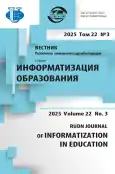Training of IT specialists in regional universities of Russia and Europe based on international recommendations: comparative analysis
- Authors: Khudzhina M.V.1
-
Affiliations:
- K.G. Razumovsky Moscow State University of Technologies and Management
- Issue: Vol 22, No 3 (2025)
- Pages: 315-331
- Section: EVOLUTION OF TEACHING AND LEARNING THROUGH TECHNOLOGY
- URL: https://journal-vniispk.ru/2312-8631/article/view/321326
- DOI: https://doi.org/10.22363/2312-8631-2025-22-3-315-331
- EDN: https://elibrary.ru/RVJBSE
- ID: 321326
Cite item
Full Text
Abstract
Problem statement. Studied the current issues in the development of IT university training in the context of global digitalization of economy and social sector. Since Russian universities now use updated Federal State Educational Standards of Higher Education (FSES 3++) that have a framework nature, the paper explains the expediency and possibility of integrating foreign experience with its curriculum approach into Russian training of IT specialists with due regard to the particular nature of a given university and a region. The overall goal of this study is to develop the methodology for comparative analysis of IT degree programs that is based on the curriculum approach and comparison with sample models and allows to make recommendations for integrating the experience of other universities and international standards into the university’s own educational programs. Methodology. Using the methodology, the paper compares bachelor degree programs in IT in two regional universities (Russian and Latvian ones). Competent experts from Russian and Latvian universities and large IT companies were asked to find out how subjects and sections of the degree programs in these universities correspond to Computing Curricula 2005 and 2020 (CC2005, CC2020) levels. Results. The paper presents graphical views that show how university curricula in IT correspond to the characteristic features of Computing Curricula models. It proves the hypothesis that both universities use Software Engineering model - the most universal one - in their IT training. The paper identifies certain peculiarities of the degree programs under study and provides some guidelines for degree programs in IT and their improvement. Conclusion. The methodology described in this research (including graphical representation) provides a mechanism that is able to highlight a degree program’s weaknesses as it is compared to one of the Computing Curricula sample models. This methodology may be applied to design or update university degree programs in various IT majors or levels.
About the authors
Marina V. Khudzhina
K.G. Razumovsky Moscow State University of Technologies and Management
Author for correspondence.
Email: mv.khudzhina@mail.ru
ORCID iD: 0000-0002-2314-4408
SPIN-code: 5777-4695
Candidate of Pedagogical Sciences, Associate Professor at the Department of Higher Mathematics, Faculty of Digital Technologies
73 Zemlyanoy Val St, Moscow, 109004, Russian FederationReferences
- Truică C-O, Barnoschi A. Innovating HR Using an Expert System for Recruiting IT Specialists – ESRIT. Journal of Software & Systems Development. 2015;2015:762987. https://dx.doi.org/10.5171/2015.762987
- Stepanova V. Quality Control Approach in Developing Software Projects. International Journal of Computer Science and Software Engineering (IJCSSE). 2019;8(1):1–5.
- Chvanova MS, Kiseleva IA, Anuryeva MS. Foreign experience in training specialists for high-tech technologies. Tambov University Review. Series: Humanities. 2021;26(190): 7–24. (In Russ.) https://doi.org/10.20310/1810-0201-2021-26-190-7-24 EDN: VZLOGB
- Bradford A, Brown H. English-medium instruction and the information technology parallel in Japanese higher education. International Higher Education. 2018;(92):24–25. http://dx.doi.org/10.6017/ihe.2018.92.9810
- Karakozov SD, Petrov DA, Khudzhina MV. The development of professional competences in accordance with professional standards within informational technologies bachelor programs. Problems of Contemporary Science and Practice Vernadsky University. 2017;(3):129–137. (In Russ.) EDN: ZQJKFJ
- Khudzhina MV. The design of the main professional educational programs in the context of bringing existing FSES HE into line with professional standards. Problems of modern Education. 2016;(2):116–120. (In Russ.) EDN: VVEYLX
- Karakozov SD, Petrov DA, Khudzhina MV. Creating educational educational programs for IT-specialists based on the employers’ demands. Informatics and Education. 2017;(9):41–45. (In Russ.) EDN: ZRNNKL
- Sukhomlin VA. International educational standards in the field of information technology. Applied Informatics. 2012;(1):33–54. (In Russ.) EDN: OPZEXN
- Sukhomlin VA, Zubareva EV. A new stage of international standardization of IT education. Modern Information Technologies and IT Education. 2021;17(3):697–723. (In Russ.) https://doi.org/10.25559/SITITO.17.202103.697-723 EDN: KEKGKW
- Sukhomlin VA, Zubareva EV, Namiot DE, Yakushin AV. The system of digital skills development at MGU & Basalt Vocational School: a methodology for classifying and describing requirements for employees and the content of educational programs in the field of information technology. Moscow: Basealt SPO; MAX Press LLC; 2020. (In Russ.) EDN: UPAMJR
- Sukhomlin VA. Analysis of international educational standards in the field of information technology. Modern Information Technologies and IT Education. 2011;(7):16–45. (In Russ.) EDN: TJTVIN
- Raj RK, Romanowski CJ, Aly ShG, et al. Toward High Performance Computing Education. In: ITiCSE ‘20: Proceedings of the 2020 ACM Conference on Innovation and Technology in Computer Science Education, 15–19 June 2020, Trondheim, Norway. New York: Association for Computing Machinery; 2020. p. 504–505. https://doi.org/10.1145/3341525.3394989
- Chikh A. A knowledge management framework in software requirements engineering based on the SECI model. Journal of Software Engineering and Applications. 2011;4(12):718–728. http://dx.doi.org/10.4236/jsea.2011.412084
- Rohn D, Bican PM, Brem Al, Kraus S, Clauss Th. Digital platform-based business models – an exploration of critical success factors. Journal of Engineering and Technology Management. 2021;60:101625. https://doi.org/10.1016/j.jengtecman.2021.101625
- Blair JRS, Chewar ChM, Raj RK, Sobiesk E. Infusing principles and practices for secure computing throughout an un-dergraduate computer science curriculum. In: ITiCSE ‘20: Proceedings of the 2020 ACM Conference on Innovation and Technology in Computer Science Education, 15–19 June 2020, Trondheim, Norway. New York: Association for Computing Machinery; 2020. p. 82–88. https://doi.org/10.1145/3341525.3387426
Supplementary files









